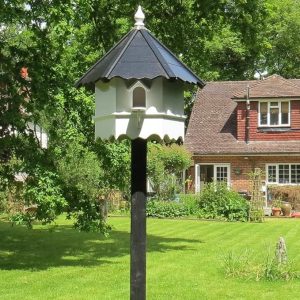Beautiful Hand Crafted Dovecote
A beautiful hand crafted Dovecote that will add a stunning feature to any garden.
Suitable for 3 pairs of doves with 6 nesting compartments, each with a landing perch.
Available on Amazon
#ad
Feeding Doves in a Dovecote
Doves are gentle and elegant birds that thrive in a dovecote setting when provided with a balanced and nutritious diet. Ensuring their health and happiness involves understanding their nutritional needs and offering a variety of appropriate food sources.
Primary Food Sources
Doves primarily thrive on grains and seeds. A commercially available pigeon mix, which typically includes millet, cracked corn, wheat, safflower, and sunflower seeds, forms a substantial part of their diet. Millet, being highly nutritious and easily digestible, is a particular favorite among doves. Canary seed is another small and highly palatable option. Additionally, commercial dove pellets can be introduced as part of their diet, offering a balanced mix of essential nutrients.
Supplementary Food Sources
To aid digestion, doves require grit. A mixture of oyster shell grit and granite grit is ideal, with oyster shell grit providing the added benefit of calcium, crucial for strong bones and egg production. Fresh fruits and vegetables, such as apples, carrots, spinach, and peas, can be given in small, finely chopped quantities to supplement their main diet. During the breeding season or molting period, additional protein sources like mealworms or small amounts of hard-boiled eggs can be beneficial.
Feeding Methods
Raised feeders help keep the food clean and free from contamination by droppings. These feeders should be stable to prevent them from being easily knocked over. Self-feeding hoppers are convenient for storing larger quantities of food, reducing the need for frequent refilling. Fresh, clean water should be provided at all times, using a shallow dish or specialized bird waterer to avoid spills and contamination. Changing the water daily and regularly cleaning the container is essential.
Feeding Schedule
Establishing a consistent feeding routine is beneficial, typically feeding the doves once in the morning and once in the evening. It’s important to adjust the portion sizes based on the number of doves and their consumption rates, avoiding overfeeding to prevent waste and discourage pests.
Special Considerations
Seasonal adjustments to the diet are necessary, with additional food required in colder months to maintain energy levels. High-energy seeds like sunflower seeds are particularly useful during winter. During the breeding season, providing extra calcium and protein supports egg production and the growth of young doves. Regular observation of the doves’ health is crucial; healthy doves have bright eyes, clean feathers, and an active demeanor. Any signs of poor health or malnutrition should prompt a consultation with a veterinarian experienced in avian care.
Hygiene and Maintenance
Maintaining clean feeding areas is vital to prevent the spread of disease. Regularly clean and disinfect feeders and water containers. Keeping the dovecote and surrounding areas clean will also help deter rodents and other pests attracted to the food.
Conclusion
Feeding doves in a dovecote requires attention to their nutritional needs and consistent feeding practices. By offering a balanced diet of grains, seeds, pellets, and occasional supplements, and ensuring clean water and feeding areas, the health and well-being of your doves can be maintained. Adjust feeding practices seasonally and monitor the health of your birds regularly for a thriving dovecote.

